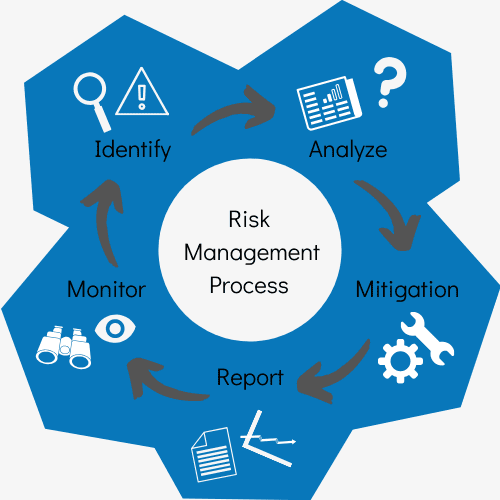How the Importance of Risk Management Promotes Successful Project Outcomes
How the Importance of Risk Management Promotes Successful Project Outcomes
Blog Article
Discovering the Relevance of Risk Management for Effective Decision-Making Approaches
In the complex globe of organization, Risk Management emerges as a crucial consider the decision-making process. The ability to recognize possible risks and opportunities, and strategize accordingly, can lead to the distinction between success and failure. With devices such as SWOT and PESTEL, companies are geared up to make educated selections, cultivating strength and adaptability in an ever-changing setting. Wondering how this functions? Allow's unload the characteristics even more.
Understanding the Principle of Risk Management
Risk Management, an essential part in decision-making, is often misconstrued or oversimplified. Normally, it describes the identification, examination, and prioritization of dangers to decrease, keep an eye on, and control the chance or effect of unfortunate occasions. Nonetheless, it's not just regarding avoiding unfavorable results, however likewise concerning recognizing prospective opportunities. Risk Management includes structured and self-displined approaches, making use of information and insightful analyses. It calls for a detailed understanding of the organization's context, objectives, and the possible risks that can combat them. From monetary uncertainties, legal obligations, strategic Management errors, to mishaps and natural catastrophes, it deals with different threats. Significantly, efficient Risk Management is not stationary; it's a constant, progressive process that evolves with changing situations.
The Role of Risk Management in Decision-Making Processes
In the world of calculated preparation and service procedures, Risk Management plays an important duty in decision-making procedures. It helps in identifying possible risks and uncertainties that could impact the success of company goals. By tracing these risks, firms can develop strategies to mitigate their effect, ensuring business continuity and stability. Risk Management thus becomes a vital tool in decision-making, aiding leaders to make informed selections based on a detailed understanding of the dangers included. It encourages a positive method, allowing companies to expect and prepare for possible future circumstances. This substantially lowers the probability of negative consequences, advertising a lot more efficient and effective decision-making techniques. Risk Management serves as a vital element in the decision-making processes of any company.

How Risk Management Enhances Strategic Preparation
In the context of tactical planning, Risk Management plays a crucial duty. Initiating with the identification of prospective risks, it even more encompasses the implementation of Risk mitigation steps. The duty of Risk Management is not fixed but vibrant, as it demands continuous surveillance and adjusting of methods.
Determining Possible Threats

Applying Risk Mitigation
Risk reduction approaches can range from Risk avoidance, Risk transfer, to take the chance of reduction. Each strategy needs to be customized to the certain Risk, considering its prospective impact and the organization's Risk resistance. Reliable Risk reduction requires a deep understanding of the Risk landscape and the potential influence of each Risk.
Surveillance and Changing Methods
Though Risk reduction is a critical action in calculated preparation, constant monitoring and change of these click for more info methods is similarly vital. It likewise gives a chance to assess the success of the Risk Management actions, allowing adjustments to be made where necessary, further boosting strategic planning. Monitoring and changing Risk Management approaches is an essential component for boosting an organization's resilience and strategic preparation.
Situation Researches: Successful Risk Management and Decision-Making
In the globe of service and finance, effective Risk Management and decision-making often offer as the pillars More hints of prosperous ventures. These situations highlight the value of sharp Risk Management in decision-making procedures. These cases emphasize the crucial function of Risk Management in tactical decision-making.
Tools and Strategies for Reliable Risk Management
These devices, such as Risk registers and warmth maps, help in identifying and examining possible risks. Risk response methods, a crucial component of Risk Management, entail approving, staying clear of, transferring, or mitigating threats. With these tools and strategies, decision-makers can navigate the complex landscape of Risk Management, thereby helping with educated and reliable decision-making.
Future Trends in Risk Management and Decision-Making Strategies
As we discover the huge landscape of Risk Management, it becomes obvious that the methods and devices utilized today will proceed to evolve. Future trends aim in the direction of an enhanced dependence on technology, with expert system and artificial intelligence playing considerable roles. These modern technologies will certainly allow organizations to anticipate potential risks with greater precision and make more enlightened decisions. Additionally, there will certainly be an expanding focus on strength, not just in managing threats however likewise in getting better from damaging situations. Lastly, the principle of Risk society, where every member of an organization understands and involved in Risk Management, will get a lot more importance. These trends declare an even more comprehensive and proactive approach towards Risk Management and decision-making.
Verdict

Risk Management thus ends up being an important tool in decision-making, aiding leaders to make enlightened options based on a thorough understanding of the threats entailed. Risk reduction approaches can range from Risk avoidance, Risk transfer, to risk decrease (importance of risk management). Effective Risk reduction requires a deep understanding of the Risk landscape and the possible effect of each Risk. Risk action approaches, a vital part of Risk Management, involve approving, avoiding, moving, or mitigating dangers. The concept of Risk culture, where every participant of an organization i loved this is conscious and entailed in Risk Management, will gain much more prominence
Report this page